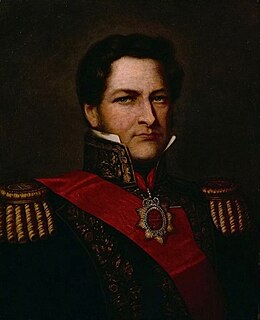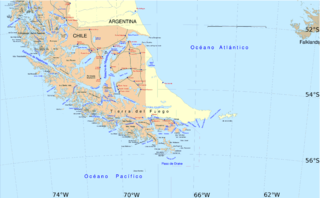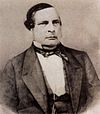
Justo José de Urquiza y García was an Argentine general and politician. He was president of the Argentine Confederation from 1854 to 1860.

Juan Manuel de Rosas, nicknamed "Restorer of the Laws", was a politician and army officer who ruled Buenos Aires Province and briefly the Argentine Confederation. Although born into a wealthy family, Rosas independently amassed a personal fortune, acquiring large tracts of land in the process. Rosas enlisted his workers in a private militia, as was common for rural proprietors, and took part in the disputes that led to numerous civil wars in his country. Victorious in warfare, personally influential, and with vast landholdings and a loyal private army, Rosas became a caudillo, as provincial warlords in the region were known. He eventually reached the rank of brigadier general, the highest in the Argentine Army, and became the undisputed leader of the Federalist Party.

Juan Bautista Alberdi was an Argentine political theorist and diplomat. Although he lived most of his life in exile in Montevideo, Uruguay and in Chile, he influenced the content of the Constitution of Argentina of 1853.

The Battle of Pavón was a key battle of the Argentine civil wars. It was fought in Pavón, Santa Fé Province, Argentina on 17 September 1861, between the Army of the State of Buenos Aires, commanded by Bartolomé Mitre, and the Army of Republic of the Argentine Confederation commanded by Justo José de Urquiza. The withdrawal of Urquiza left the field to Mitre.

Alita Blanca Barchigia, better known as Alita Román, was an Argentine film actress of the Golden Age of Argentine Cinema (1940–1960).

The Papal mediation in the Beagle conflict followed the failure of negotiations between Chile and Argentina, when, on 22 December 1978, the Argentinian Junta started Operation Soberanía, to invade Cape Horn and islands awarded to Chile by the Beagle Channel Arbitration. Soon after the event, Pope John Paul II offered to mediate and sent his personal envoy, Cardinal Antonio Samoré, to Buenos Aires. Argentina, in acceptance of the authority of the Pope over the overwhelmingly Catholic Argentine population, called off the military operation and accepted the mediation. On 9 January 1979, Chile and Argentina signed the Act of Montevideo formally requesting mediation by the Vatican and renouncing the use of force.

Argentina, officially named the Argentine Republic, is a country located mostly in the southern half of South America. Sharing the bulk of the Southern Cone with Chile to the west, the country is also bordered by Bolivia and Paraguay to the north, Brazil to the northeast, Uruguay and the South Atlantic Ocean to the east, and the Drake Passage to the south. With a mainland area of 2,780,400 km2 (1,073,500 sq mi), Argentina is the eighth-largest country in the world, the fourth largest in the Americas, and the largest Spanish-speaking nation. The sovereign state is subdivided into twenty-three provinces and one autonomous city, Buenos Aires, which is the federal capital of the nation as decided by Congress. The provinces and the capital have their own constitutions, but exist under a federal system. Argentina claims sovereignty over part of Antarctica, the Falkland Islands, and South Georgia and the South Sandwich Islands.

The Argentine Civil Wars were a series of civil wars that took place in Argentina from 1814 to 1880. These conflicts were separate from the Argentine War of Independence (1810–1820), though they first arose during this period.
Omar Acha is an Argentine historian and political essayist. He is a researcher at the Consejo Nacional de Investigaciones Científicas y Técnicas and also at the Centro de Investigaciones Filosóficas (Argentina). He teaches Philosophy of History at the Universidad de Buenos Aires. He is also a member of the editorial board of Herramienta. Revista de Teoría y Crítica Marxista, published in Buenos Aires.

The Argentine presidential election of 1854 was held on 20 February to choose the first president of the Argentine Confederation for the period 1854-1860. Justo José de Urquiza was elected president by a wide margin.

The Argentine presidential election of 1862 was held on 4 September to choose the first president of Argentina. Bartolomé Mitre was elected president.
The Argentine presidential election of 1874 was held on 12 April to choose the president of Argentina. Nicolás Avellaneda was elected president.
The Argentine presidential election of 1880 was held on 12 April to choose the president of Argentina. Julio Argentino Roca was elected president.
The Argentine presidential election of 1886 was held on 11 April to choose the president of Argentina. Miguel Juárez Celman was elected president.
The Argentine presidential election of 1892 was held on 10 April to choose the president of Argentina. Luis Sáenz Peña was elected president.
The Argentine presidential election of 1904 was held on 12 June to choose the president of Argentina. Manuel Quintana was elected president.
The Argentine presidential election of 1910 was held on 13 March to choose the president of Argentina. Roque Sáenz Peña was elected president.















